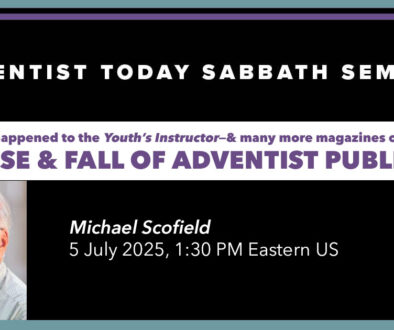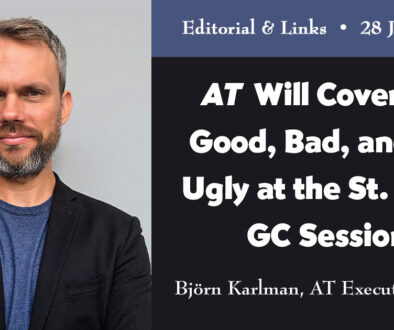Exit Interviews: Why Do People Leave the Church?
29 April 2021 |
Read this essay in preparation for this Sabbath’s class.
Excerpt:
There have been a number of projects dedicated to looking at attrition in Seventh-day Adventism, at who leaves the denomination and why. One of the most recent is this presentation by Dr. David Trim, the church’s Director of Archives, Statistics and Research, presented in 2016. (Dr. Trim has also been interviewed on the topic.)
While some studies have been conducted that did interview former Adventists to ask about their reasons for leaving the church (and Dr. Trim’s work does draw on those studies), many such presentations simply assume the reasons. The most common explanations given by current Adventists for why former Adventists have left are: (1) having been “hurt” in some way by the actions of church members or (2) wishing to “enjoy a life of sin” without the constraints on behavior of religious belief.
I thought there’d be value in simply asking some former members about their reasons for leaving, to try to develop a more nuanced understanding of what is going on for people. I should note that, although I do social science research in my day job, and have even published books on research methodology, this is by no means a formal study, and the results are only indicative. It’s an informal conversation with friends. From an ethics perspective, I won’t use any names, and I have the consent of all participants to share their reasons and stories.
It’s worth thinking about the “destinations” where former believers find themselves… or at least, the current waypoints on their life journey. By no means all end up “enjoying that life of sin”—in fact, very few do. Quite a few join some other Christian denomination, or consider themselves “spiritual but not religious.” Others become, if not “agnostic,” perhaps “apatheist”: apathetic toward God and religion. They are not anti-religious, particularly; they just consider that religious belief has no meaning or relevance in their lives. They find meaning in their relationships and secular (non-religious) activities.
And, of course, some also become atheists who consider that religious belief in general is a delusion. Even within the atheist group, some are more strongly anti-theistic while others are closer to the apathetic position.
I think this is important, because it takes us a little beyond the binary of “Adventist = saved, non-Adventist = lost.” If we genuinely accept that believers in other Christian denominations can be saved, then attrition from Adventism is not seen as necessarily attrition from faith or salvation. A more sophisticated and nuanced understanding of where people find themselves “after Adventism” is simply more accurate, and therefore more useful, than a simplistic binary.
I’ve asked a number of people in an online group I’m part of, and here are some of the answers. I try to group them a little, without presenting them in rank order or order of frequency of responses—the body of data is too small for that kind of analysis.
- Being “defined out” – people who feel that Adventism has been defined (including in changes to the Fundamental Beliefs) in ways that define them as being “outside,” and choose to accept that
- Studying their way out – people who have been convinced by very extensive and careful study of scripture and theology that various claims of Seventh-day Adventism are not supported by the best available evidence
- Recent creationism – people who find the very strong insistence on a literal 6-day creation week less than 10,000 years ago impossible to reconcile with their understanding of science. This is sometimes associated with anti-science perspectives on other issues such as the health effects of coffee or masturbation.
- Hierarchy – people who believe the denomination should be more congregational and local rather than global, so that local cultural differences can be accepted, rather than requiring uniformity
- Institutional protection of sexual predators – people who have been horrified by the treatment of survivors of sexual abuse (including themselves or people close to them) and their abusers, including cover-ups and “moving along”
- Women’s ordination – people who believe that some women are called to pastoral ministry and should be in all ways equal with men in that calling
- Morality of God – people who find the God who killed almost everyone on Earth in a Flood and commanded genocide of women and children after the Exodus morally unacceptable
- Sexuality – people who are gay, bi or trans and were told their very existence was wrong and excluded by both doctrine and practice
- Fluidity of belief – people who are not rigid in their belief structures, and who “flowed in” and later “flowed out” of belief
- Never believed – people who never really believed in supernatural things, in many cases despite being brought up in the church, and left once they were socially free to do so
- Claimed inerrancy of Scripture and Ellen G White – people who have identified errors in the Bible or the writings of Ellen White, when both are (sometimes) claimed to be inerrant (noting that inerrancy is not mainstream Adventist doctrine in either case)
- Inconsistencies within Scripture or between doctrine and Scripture – people who have identified inconsistencies within the Bible, within the writings of Ellen White, between EGW and the Bible or between the Bible and Adventist doctrinal positions
- Desmond Ford, his treatment at Glacier View and the Investigative Judgement – people (usually old enough to have been around at the time) who accept Dr. Ford’s critique of the Investigative Judgement doctrine, and/or who believe that his treatment by the denomination at the time and later was unfair
- Exclusive truth claims – people who find it impossible, in a very large and very diverse world of almost 7.9 billion people that a small group of 22 million Adventists (about 0.3% of the global population) has the One True Way and the other 99.7% of all human beings are just wrong
If Adventism is keen to reduce the attrition rate, serious attention to some of these concerns – especially the moral and ethical dimensions – will be essential. There will also, however, be people for whom Seventh-day Adventism is not an appropriate “fit” or spiritual home, and perhaps farewelling people amicably, without rancor and with best wishes is a better approach than simply considering them “lost.”
Guest teacher:
Dr. David Geelan is Sue’s husband and Cassie and Alexandra’s dad. He started out at Avondale College and has ended up (so far) as an Associate Professor of Science Education at Griffith University on the Gold Coast, Australia.
Moderator:
Floyd Pönitz currently serves as the Vice President of SDA Kinship Intl. He is a graduate of Southwestern Adventist University and lives in Dallas, Texas.
How to join:
This class is over. You can watch the presentation here.
When:
ATSS starting time depends on where you are. If you’re on the west coast of the United States, it’ll be 10:30 AM. On the east coast, 1:30 PM.
Times around the world:
- College Place: 10:30 AM
- Lincoln: 12:30 PM
- Cheyenne: 11:30 AM
- Cooranbong: 3:30 AM (Sunday)
- Bracknell: 6:30 PM
- Loma Linda: 10:30 AM
- Nairobi: 8:30 PM
- Hosur: 11:00 PM
- Tulsa: 12:30 PM
- Helsinki: 8:30 PM
- Stockholm: 7:30 PM
- Hamburg: 7:30 PM
- Capetown: 7:30 PM
- Madrid: 7:30 PM
- Paris: 7:30 PM
- Honolulu: 7:30 AM
The class is intended to last about 2 hours, though the conversation may go a bit longer.
About our class:
- The AT Sabbath Seminar is intended to be a courteous forum. We discuss and ask questions politely. We don’t accuse, get angry, or put people down.
- Make your comments and questions short—don’t dominate.
- Keep your microphones muted unless you are called upon to make your comment or ask your question.
- Indicate your interest in speaking by raising your electronic hand—under the “reactions” button.
- Those who make accusations or unkind statements will be muted or removed.
- Please use your name when you sign in! Not your phone number, not your initials. This will help us differentiate you from unwelcome guests who want to disrupt us. You can set your name after signing on by clicking on the 3 dots next to your picture, which drops down a menu.
- If it should happen that we are attacked so that we have to stop the meeting, we’ll quickly post a new meeting link on our AT Facebook page.
We look forward to getting acquainted with you!
Coming up:
- —5/8 Ron Graybill, “My Life with Ellen White”




